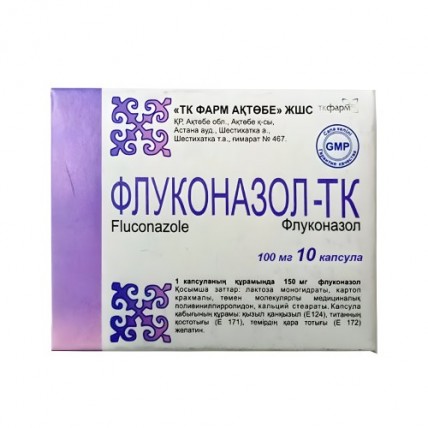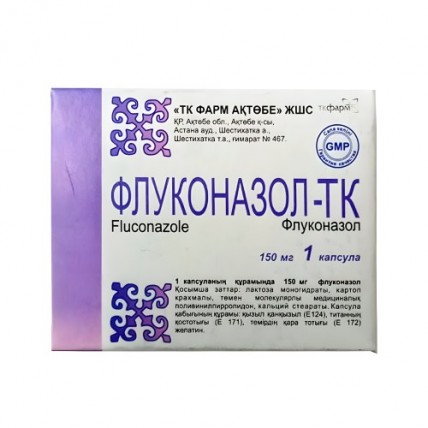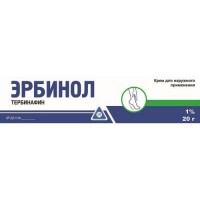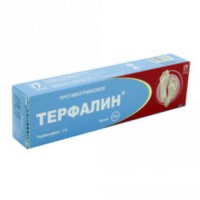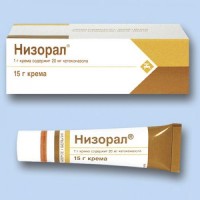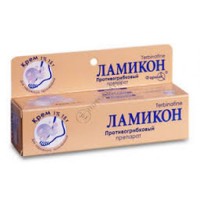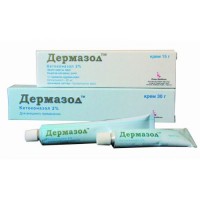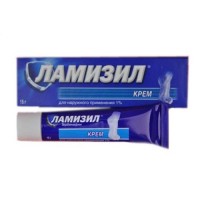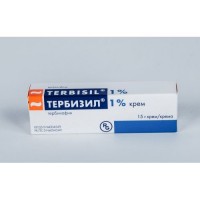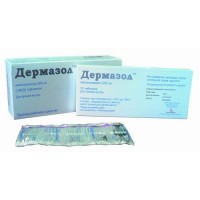Fluconazole-TK 100 mg/150 mg capsules
- $5.00
What is Fluconazole-TK 100 mg/150 mg?
Fluconazole-TK is an antifungal medication available in capsule form at dosages of 100 mg and 150 mg.
It is used to treat a variety of fungal infections, both superficial and systemic, by inhibiting the growth of fungi.
The active ingredient in each capsule is fluconazole, which works by blocking the production of ergosterol, a vital component of fungal cell membranes.
How does Fluconazole-TK work?
Fluconazole-TK belongs to the triazole class of antifungals. It functions as a selective inhibitor of fungal 14α-demethylase, an enzyme crucial for synthesizing ergosterol.
By disrupting the production of ergosterol, fluconazole weakens the fungal cell membrane, ultimately inhibiting the growth and spread of the infection.
Fluconazole-TK is effective against various fungi, including Candida spp., Cryptococcus neoformans, and others.
What are the common uses of Fluconazole-TK?
Fluconazole-TK is prescribed for treating and preventing a range of fungal infections, including:
- Cryptococcosis: Such as cryptococcal meningitis, affecting the lungs, skin, and other body parts.
- Systemic candidiasis: Including candidemia, disseminated candidiasis, and infections of the abdomen, endocardium, eyes, respiratory, and urinary tracts.
- Mucosal candidiasis: Affecting the mouth, throat, and esophagus, as well as chronic atrophic candidiasis in denture wearers.
- Genital candidiasis: Including vaginal yeast infections and candidal balanitis.
- Fungal infection prevention: In immunocompromised individuals, such as those undergoing chemotherapy or radiation.
- Dermatomycosis: Such as athlete's foot, ringworm, and onychomycosis (nail fungus).
How should Fluconazole-TK be taken?
Fluconazole-TK should be taken orally, usually once a day, and can be taken with or without food.
The specific dosage and duration of treatment depend on the type and severity of the fungal infection, as well as the patient’s age, weight, and overall health condition.
Below are the general dosing guidelines for various conditions:
For Adults:
Cryptococcal infections (including cryptococcal meningitis):
- Initial dose: 400 mg on the first day.
- Maintenance dose: 200-400 mg once daily.
- Duration: Treatment typically lasts for 6-8 weeks, or longer if needed. For preventing recurrence in patients with AIDS, ongoing therapy with 200 mg once daily may be prescribed.
Systemic candidiasis (e.g., candidemia, disseminated candidiasis, peritonitis, etc.):
- Initial dose: 400 mg on the first day.
- Maintenance dose: 200-400 mg once daily.
- Duration: Continue treatment until clinical and microbiological signs indicate that the infection has been resolved. The duration can vary depending on the severity of the infection and patient response.
Oropharyngeal candidiasis:
- Dose: 100-150 mg once daily.
- Duration: Usually 7-14 days. In cases of severe or recurrent infections, treatment may be extended.
Atrophic oral candidiasis (associated with denture use):
- Dose: 100 mg once daily.
- Duration: 14 days, combined with local antiseptic measures for denture care.
Other mucosal candidiasis (except vaginal candidiasis):
- Dose: 100 mg once daily.
- Duration: Typically 14-30 days, depending on the site of infection and its severity.
Vaginal candidiasis:
- Dose: A single dose of 150 mg.
- This is often sufficient for treating acute episodes. However, for patients with frequent recurrences (three or more episodes per year), your doctor might recommend maintenance therapy with a lower dose taken periodically.
Candidal balanitis:
- Dose: A single dose of 150 mg.
Prevention of fungal infections in immunocompromised patients (e.g., those undergoing chemotherapy or radiation therapy):
- Dose: 100 mg once daily.
- Duration: Continue as long as the patient remains at risk for developing an infection.
Dermatomycosis (e.g., athlete’s foot, ringworm, etc.):
- Dose: 150 mg once weekly or 100 mg daily.
- Duration: Generally 2-4 weeks, but for infections of the foot, treatment may be extended up to 6 weeks.
Onychomycosis (nail fungus):
- Dose: 150 mg once weekly.
- Duration: Continue treatment until a healthy nail has completely replaced the infected nail, which may take several months depending on the growth rate of the nail.
For Elderly Patients:
- If there are no signs of kidney impairment, the usual adult dose can be taken.
- For those with kidney impairment, the initial dose remains 100-400 mg depending on the infection. Subsequent doses should be adjusted based on creatinine clearance rates.
Dosage Adjustments for Kidney Impairment:
- Creatinine clearance > 50 mL/min: 100% of the recommended dose.
- Creatinine clearance 11-50 mL/min: 50% of the recommended dose.
- Patients undergoing regular dialysis: One dose should be administered after each dialysis session.
Important Administration Guidelines:
- Consistency: To maintain consistent drug levels in the body, take the medication at the same time each day.
- Missed Dose: If you miss a dose, take it as soon as you remember. If it is almost time for your next dose, skip the missed dose. Do not double the dose to catch up.
- Completion of Therapy: It is essential to complete the full course of therapy, even if symptoms improve before finishing the medication, to prevent recurrence of the infection.
What are the possible side effects of Fluconazole-TK?
Fluconazole-TK is generally well-tolerated, but side effects may occur. Common side effects include:
- Headache
- Nausea, vomiting, or stomach pain
- Diarrhea
- Elevated liver enzymes
- Skin rash
Less common but serious side effects can include liver toxicity, severe skin reactions, and anaphylaxis.
If you experience any severe or unusual symptoms, contact your healthcare provider immediately.
What precautions should be taken with Fluconazole-TK?
Before using Fluconazole-TK, inform your doctor if you have liver or kidney disease, heart rhythm disorders, or electrolyte imbalances.
This medication may interact with other drugs, such as blood thinners, anti-seizure medications, and certain antibiotics.
It’s important to inform your doctor of all medications you are taking to avoid potential interactions.
How should Fluconazole-TK be stored?
Store Fluconazole-TK capsules in a dry, light-protected place at temperatures not exceeding 25°C (77°F).
Keep the medication out of reach of children. Do not use it after the expiration date printed on the package.
What should be done in case of an overdose?
In the event of an overdose, symptoms may include nausea, vomiting, diarrhea, or seizures.
If an overdose is suspected, seek immediate medical attention. Treatment may involve gastric lavage and symptomatic therapy.
Forced diuresis can help speed up the elimination of the drug, and hemodialysis may reduce fluconazole levels by approximately 50%.
